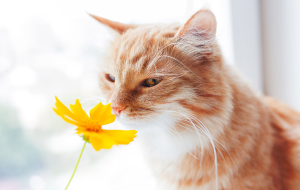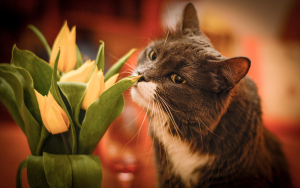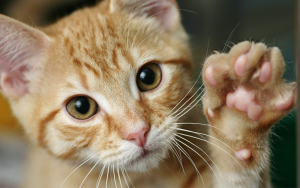Why Do Cats Eat Grass? The Surprising Reasons Behind This Curious Behavior

Cats are known for their meticulous grooming habits, sharp hunting instincts, and independent nature. However, one behavior that often perplexes cat owners is their tendency to munch on grass. If you’ve ever caught your feline friend nibbling on the green
blades, you may have wondered why cats eat grass in the first place. While this behavior may seem odd to us, it is actually quite common among both domestic and wild cats.
In this article, we’ll dive into the reasons why cats eat grass, explore the science behind this behavior, and provide insights into how it may impact their health. We’ll also address common concerns and provide tips on how to manage this behavior for
your cat’s well-being. Let’s explore this fascinating aspect of feline behavior and what it means for your pet’s health.
Understanding the Behavior: Is Eating Grass Normal for Cats?
While it may seem unusual to see a cat nibbling on grass, it is actually a behavior shared by many feline species, both domesticated and wild. Whether it’s your indoor cat pawing through the potted plants or your outdoor cat snacking on lawn grass, this
behavior is relatively common. In fact, studies show that up to 70% of domestic cats engage in grass-eating at some point in their lives.
The first question that comes to mind is: Is it normal for cats to eat grass?
The short answer is yes. While cats are obligate carnivores (meaning their diet consists primarily of animal-based proteins), eating grass does not seem to pose a significant health risk, as long as the grass is not treated with pesticides or harmful
chemicals. In fact, some experts believe that eating grass is a natural behavior rooted in the evolution of cats.
Possible Reasons Why Cats Eat Grass
1. To Induce Vomiting and Clear Their Stomach
One of the most widely accepted explanations for why cats eat grass is to induce vomiting. Grass is a natural emetic (a substance that promotes vomiting), and when ingested, it can irritate a cat’s stomach lining, which may lead to the expulsion of hairballs,
undigested food, or other irritants that could be causing discomfort.
Cats, especially those with long coats, can develop hairballs from grooming. These hairballs can become a source of irritation in the digestive tract, prompting the cat to consume grass to help them regurgitate. This process, known as self-medication,
is not unique to cats; many animals will seek out certain foods or substances to alleviate discomfort.
2. For Dietary Fiber
Another reason why cats may eat grass is to supplement their diet with additional fiber. While cats primarily rely on meat for their nutritional needs, they may instinctively seek out fiber-rich plants to aid in digestion. Fiber helps regulate the digestive
system by promoting healthy bowel movements, which can help alleviate constipation or other gastrointestinal issues.
In the wild, cats may consume small amounts of plant matter, such as the stomach contents of herbivorous prey animals. While domesticated cats do not need to hunt for their food, the instinct to seek out fiber may still be present.
3. Nutrient Deficiency
Some experts believe that grass-eating in cats could be a response to a deficiency in certain nutrients. Cats require specific vitamins, minerals, and amino acids in their diet, and if they are not receiving enough of these nutrients from their regular
food, they may instinctively turn to grass to fulfill their nutritional needs.
For example, grass contains trace amounts of folic acid, a water-soluble B vitamin that is essential for the production of red blood cells and the proper functioning of the nervous system. Folic acid is found in meat, but it may be more readily available
in small quantities through grass or other plant matter. Although this theory is not fully proven, it remains a possibility worth considering.
4. To Relieve Boredom or Anxiety
Just like humans, cats can experience boredom or anxiety, and some may resort to eating grass as a coping mechanism. This behavior is particularly common in indoor cats who may lack stimulation or entertainment. In such cases, grass-eating could be a
way for the cat to pass the time or alleviate stress.
Moreover, anxiety-induced behaviors in cats are not uncommon. Some cats may eat grass to self-soothe, particularly if they are feeling anxious or unsettled. If your cat is eating an excessive amount of grass or seems particularly stressed, it may be worth
investigating possible causes of anxiety, such as changes in the household environment or routine.
5. Instinctual Behavior from Their Wild Ancestors
Cats are instinctively hunters, and their wild ancestors likely consumed plant matter as part of their diet. While domestic cats may not hunt the way their wild counterparts do, they still retain some of the instinctual behaviors that once served their
survival needs.
Wild cats like lions, tigers, and cheetahs are known to occasionally eat grass, even though they are strict carnivores. It’s believed that these wild felines might eat grass to help with the elimination of parasites or to aid digestion. Similarly, domestic
cats may display this inherited instinct by eating grass from time to time.
Potential Health Risks of Eating Grass
While grass-eating is typically harmless, there are some risks to be aware of. These include:
1. Chemical Exposure
If your cat is eating grass that has been treated with pesticides, herbicides, or other chemicals, this can pose a significant health risk. These chemicals can be toxic to cats and may lead to poisoning, gastrointestinal upset, or other health issues.
To mitigate this risk, ensure that any grass your cat consumes is free of chemicals, or grow your own pet-safe grass indoors.
2. Choking Hazard
In rare cases, long or tough grass blades can pose a choking hazard. If your cat consumes a large amount of grass at once or swallows it too quickly, it may lead to an obstruction in the throat or intestines. Watch for signs of choking or difficulty swallowing,
and seek veterinary help if you suspect that your cat has ingested something hazardous.
3. Gastrointestinal Distress
While most cats eat grass to help with digestion, excessive consumption of grass could lead to gastrointestinal distress. Overeating grass can cause vomiting, diarrhea, or other digestive issues. If your cat is eating an abnormal amount of grass, it may
indicate an underlying health problem or an imbalance in its diet.
How to Manage Your Cat’s Grass-Eating Behavior
If you’re concerned about your cat’s grass-eating habits, here are a few tips to help manage the behavior:
1. Provide Safe, Pet-Friendly Grass
One of the best ways to ensure that your cat’s grass-eating behavior is safe is by offering them pet-friendly grass. You can purchase specially grown grass for cats, such as wheatgrass, at pet stores or online. This type of grass is free from harmful
chemicals and can satisfy your cat’s craving for plant matter in a safe way.
2. Keep Your Cat Stimulated
If your cat is eating grass due to boredom or anxiety, providing more mental and physical stimulation can help curb the behavior. Interactive toys, puzzle feeders, or even another pet can provide the entertainment and companionship your cat needs to feel
more content.
3. Ensure a Balanced Diet
A high-quality, well-balanced diet can help address potential nutritional deficiencies that might drive your cat to eat grass. Ensure your cat’s food contains all the necessary nutrients, including protein, vitamins, and minerals, and consult your vet
if you suspect a deficiency.
4. Limit Access to Outdoor Plants
If your cat spends time outdoors, monitor their access to plants that may not be safe for consumption. Many common plants, such as lilies, azaleas, and ivy, are toxic to cats. Make sure your cat does not have access to these plants, or create a designated
outdoor area for them to roam safely.
When to See a Vet
If your cat’s grass-eating behavior seems excessive, or if they experience prolonged vomiting, diarrhea, or other gastrointestinal issues after consuming grass, it’s important to consult a veterinarian. Persistent vomiting or digestive problems could
be a sign of a more serious underlying health condition, such as gastrointestinal disease, parasites, or an obstruction in the digestive tract.
Final Thoughts
While the sight of your cat munching on grass might seem strange, it’s typically a harmless behavior that serves a variety of purposes, from aiding digestion to addressing boredom. As long as the grass is free from harmful chemicals and your cat isn’t
exhibiting excessive or harmful behavior, there’s no need for concern.
By understanding why cats eat grass, you can ensure that your feline friend remains healthy and happy. Providing safe grass alternatives, maintaining a balanced diet, and offering enrichment activities are all ways to manage this behavior and support
your cat’s well-being.







